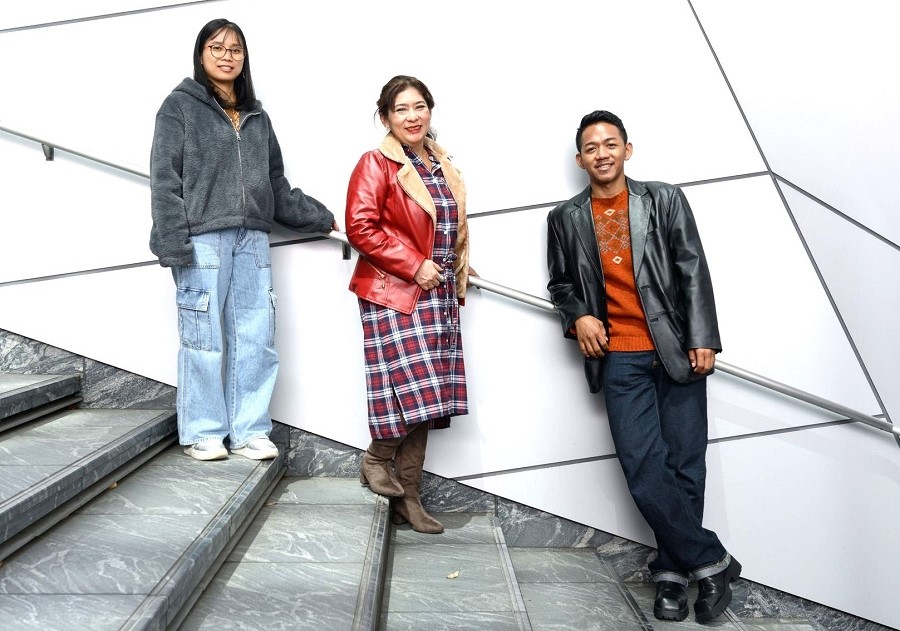Intercultural Crosstalk
Caregivers From Abroad② -Life as a caregiver-

See their profiles here
Click for "1st Round" Here
Round 2: Life as a caregiver
Caregivers work shifts, so the time they start work varies from day to day. How do they manage their health and what kind of life do they lead? How do they spend their days off?
We also asked them about the difficulties they face in continuing to work in a field that is said to be short of staff.
When Is Your Work Schedule Decided?

The work is based on a shift system. There are 3 shifts: early, late and night. The early shift is from 7am to 4pm, the late shift is from 10am to 7pm, and the night shift is from 5pm to 10am the following day.
The work schedule for the following month is released around the 25th of each month. If you request a day off in advance, you can take it whenever you like. The number of people who come to work each day is fixed, so the person in charge of creating the schedule will make the necessary adjustments. In total, this gives you 2 days off per week.
I work the same kind of shifts as Apri, but the wording is different. There are early shifts, day shifts, late 3 (a kind of late shift), and night shifts. Late 3 is from 11am to 8pm (it differs depending on the facility). I also work shifts, but I tell them my preferred days off for the next month by the 10th of each month.
I work shifts, too, and the way I work is roughly the same as the 2 of you. I give my schedule preferences a month in advance. I work for about 13 to 14 days a month. I don't work the day after a night shift.
The same goes for me. Because night shifts are long, they count as 2 days' worth of work. The day after a night shift is a paid holiday. If you work 5 night shifts in a month, you get 5 days off. Once you get used to the work, you feel like you don't get enough days off if you don't work a night shift.
There are lots of days off in the nursing care job. However, because the hours you work are scattered, it's difficult to keep your schedule in order and maintain a regular rhythm of life.
I work night shifts at least 4 times a month. I get an hour's break during night shifts.
I also work at least 4 night shifts. The regular break for night shifts is 2 hours, and we take it in shifts. 1 person is in charge of each floor.
At our facility as well, there is only 1 person per floor working the night shift.
The busiest time of the day is when we serve the meals, because some people need help when they eat.
During the year, we are busy preparing for events such as Christmas, New Year's and the summer festival. For the summer festival, we set up food stalls.
My workplace is a special elderly care home, so there aren't many events. The facility is new, so there may be more from now on.
We have various events. We have bazaars, and we also have clothes shops come and people can enjoy shopping.
Recently, elderly care has evolved. There are so many fun things to do that I would like to join in if I am healthy at that stage in life.
What Do You Do on Your Days Off?

The time I go to bed changes depending on my schedule for the next day. If I have a night shift the next day, I might think about watching TV, but if I have an early shift, I'll just eat dinner and go to sleep without doing anything, and it just happens naturally.
Since my shifts vary from day to day, sometimes I wake up too early because I've got the time wrong. I've made a mistake with my shift a few times now. That's my fault though.
When I get home after night shift and go to sleep, I wake up and can't remember whether it's a day off or a work day.
Q. What do you do on the day off after night shift?
I go home and sleep for about 3 hours. Then I go to see my family in Kanagawa or Ibaraki prefecture.
How I spend my days off depends on the weather. After night shifts, I try to stay awake as long as possible so that I can sleep at night. I do this so that I don't disrupt my morning routine the next day. On days when the weather is bad, I do housework. When I take a day off and go out, I go skiing in Hakuba. There is no snow in Indonesia.
On days after night shifts, I go home, do the housework, and then go to bed. Even when I'm trying to sleep, I keep playing with my phone. I go to bed after dinner, but I can sleep until around 10 o'clock the next day. I've only been living in Tokyo for a short time, so I'm still not sure how to use the train system, so I tend to stay at home a lot. I haven't been able to go out and have fun much yet.
I often go on trips with the people I work with, and when we have to work the night shift together, we go to hot springs afterwards.
There are regular drinking gatherings at work. Also, the company facilities are in Atami, so we all go there in groups of half the staff at a time.
Recently, I went to the aquarium with someone from Vietnam who works at my workplace.
At the facility in Yamanashi where I used to work, the Japanese people at my workplace also took me to various places.
Is There a Shortage of Staff At Your Workplace?

Yes, we think there's a shortage of personnel.
But things aren't that critical at my workplace. At the moment, there is hardly any overtime. Even so, it's still difficult to keep the shifts going. If staff members are absent due to illness, we can't suddenly increase the number of staff, so the scheduled times inevitably slip and get delayed.
I've had times when I couldn't provide the care I wanted because I had to do things that we would normally do with 2 people, by myself.
I think there are fewer people continuing in the caring profession than being understaffed. There are more Japanese people quitting. I am in charge of training, and sometimes I give advice to new graduates. Some of them don't really understand the meaning of their work, asking "Why do I have to bathe a grandmother I don't know?" So we talk about various things over dinner. Now they are wonderful caregivers.
There aren't many people who want to work in elderly care. Even though they've learned their job well, there are people who end up quitting.
I've heard that the Japanese image of caregivers is that it's a tough, dirty job with a low salary (known as "3K" in Japanese). But as someone who actually works in the field, I don't think that's the case.
When I was working in Yamanashi Prefecture, there were few Japanese staff who quit. They worked there for 10 or 15 years. 3 Burmese people joined them and we worked together, but the number of Japanese staff did not increase.
Do You Ever Find Your Work Tough?

I think the most difficult thing is when you lose control of your emotions, especially when dealing with people with dementia. They ask you the same thing over and over again, but even if you get angry, they won't understand, and they won't know why you're angry. I fight with myself, thinking that if I get angry or frustrated, I've lost.
I also think that the people with dementia are the most challenging.
I am in charge residents with dementia. It is hard to be asked the same thing over and over again, but I think it would be painful to always forget.
Residents with dementia often say they feel lonely. When they are calm, I create opportunities for them to be useful to others, such as by asking them to give me advice about my fictional problems.
I often hear about worries from residents too. I listen to their concerns about money and meals, and I try to reassure them.
There is a foreign resident who speaks Spanish. When I spoke to them in Spanish, they seemed relieved and were very happy.
I talk to my stable residents about various things. They talk to me about their old love lives, how they overcame difficult times in their lives, and so on.
That's true. They tell us about the time when they were young and worked hard, and about the most brilliant time of their lives.
Even with their irregular schedules, everyone has found a way to spend their time that suits them. Even though they are busy, it came across in the 3 participants' stories that they are communicating well with the residents and providing care that is tailored to each resident.
In the next article, which will be the 3rd in the series, they will talk about the future of the elderly care profession.
── Continued in the Following Issues
